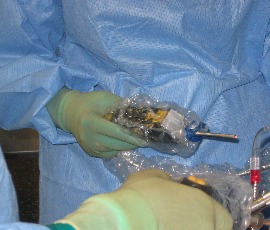New ARUK grant awarded
A new grant has been awarded to Dr Jay Dudhia to investigate "the application of Raman arthrospectroscopy for intra-operative mapping of early articular cartilage degeneration"
Arthritic conditions that affect joints such as the knee and hip include osteoarthritis, which affects nearly 9 million people within the UK. It is the commonest cause of morbidity and pain. Its prevalence is particularly increased in the older age group with 33% of people aged 45 years seeking treatment and increasing (49% women, 42% men) in those over 75 years, yet there is currently no cure.
It is also of major concern for the management of joint pain in large and small companion animals.There is progressive degeneration of the smooth lubricating cartilage at the end of bones over many years (often >2 decades), which results in friction and painful movement of the joint. The erosion of the cartilage often results in the need for artificial joint replacement. The prolonged course of the disease has a major impact on patients and on healthcare costs.
The main impediment to developing treatments is the inability to measure early stages of the disease than is currently possible. Technological advances in imaging of joint disease would significantly benefit patients and healthcare services through reduction in care costs, surgical procedures and clinician time.
We have recently developed a novel method to identify early alterations in the chemical makeup of the cartilage using an optical method known as Raman spectroscopy. Laser light is used to illuminate the cartilage and the scattered photons are captured to create a light spectrum that can reveal disease-associated changes much earlier than is currently possible with routine radiology (X-ray) or by specialist MRI.
In work funded by the NIHR we have demonstrated in a small experimental study that the technology can be adapted for clinical use to identify early and late phase of disease during routine exploratory arthroscopic examination of knees of patients with osteoarthritic complaints.
Developing the technology
Our research has indicated the potential for clinical applications however the technology remains at an early stage to fully develop into a clinical device. In a new initiative to advance technological innovations for orthopaedic conditions, Arthritis Research UK has funded our work to advance the technology towards a functional clinical device.
The work will enable us to consolidate the technology as a beneficial medical application to bring it closer to market so that it is best placed to license to an orthopaedic sector company for final device development. The technology could potentially benefit related but less onerous medical applications such as regenerative medicine and tissue engineering where non-destructive testing of materials would be extremely useful.

You may also be interested in:
-
A painful tail: RVC research reveals which dogs have greatest risk of a tail injury
A new study from the Royal Veterinary College (RVC) has found that the Boxer, English Springer …

